 Punjab MLA Harmeet Singh Pathanmajra has sent shockwaves across the state by claiming that the government is targeting him for speaking out against administrative failures. He alleges that the Punjab Police may stage a fake encounter against him—a chilling charge that questions the very foundations of law and governance. If true, this is not just an attack on one legislator; it is a warning sign for every citizen in Punjab about the misuse of power and erosion of democratic norms.
Punjab MLA Harmeet Singh Pathanmajra has sent shockwaves across the state by claiming that the government is targeting him for speaking out against administrative failures. He alleges that the Punjab Police may stage a fake encounter against him—a chilling charge that questions the very foundations of law and governance. If true, this is not just an attack on one legislator; it is a warning sign for every citizen in Punjab about the misuse of power and erosion of democratic norms.
In a functioning democracy, dissent—even within ruling parties—should be seen as a strength, not a threat. Pathanmajra’s only “crime” appears to be his willingness to raise inconvenient truths about government functioning. Instead of addressing his concerns through dialogue or administrative review, the state appears to be responding with intimidation. Such behavior undermines the very essence of democratic governance, where criticism should lead to reform, not retaliation.
The principle of the rule of law is clear: guilt or innocence is to be determined by courts, not by police action or political expediency. If law enforcement agencies are used as instruments of vengeance, justice is reduced to a performance of fear. Fake encounters may remove individuals from the public eye, but they also destroy faith in institutions meant to uphold fairness and accountability. When the public loses faith in these mechanisms, democracy itself is at risk.
This episode also exposes the dangerous trend of internal authoritarianism within the ruling establishment. When elected representatives cannot speak without fear of persecution from their own government, it signals a shift from accountability to coercion. Healthy debate within a party is essential for policy-making, governance, and public trust. Stifling this debate through threats or abuse of power destabilizes both the political system and public confidence.
The implications extend beyond one MLA. Citizens must ask themselves: if a lawmaker cannot speak freely, what protection do ordinary citizens have against arbitrary state action? Punjab has historically been a state with a strong democratic culture, but such incidents threaten to erode the very freedoms that its people have long fought to protect. It is a stark reminder that democracy is fragile and must be defended actively.
Civil society, media, and opposition parties now have a critical role to play. Transparency, scrutiny, and public pressure are necessary to ensure that the government respects both the law and its elected representatives. Simultaneously, the judiciary must act swiftly to guarantee the safety of Pathanmajra and reaffirm that no one is above the law. Vigilance and accountability are the only safeguards against the misuse of power.
Harmeet Singh Pathanmajra’s warning should not be dismissed as political theatrics. It is a call to action—a test for Punjab’s institutions, leaders, and citizens. The integrity of democracy depends not on popularity or power, but on the protection of dissenting voices and the strict enforcement of law and justice. If these warnings are ignored, Punjab risks a dangerous precedent: where fear replaces debate, intimidation replaces accountability, and the rule of law is eroded